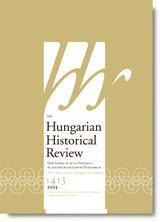Not a Jewish Question?
Not a Jewish Question?
The Holocaust in Hungary in the Press and Propaganda of the Kádár Regime during the Trial of Adolf Eichmann
Author(s): Kata BohusSubject(s): History of the Holocaust
Published by: Magyar Tudományos Akadémia Bölcsészettudományi Kutatóközpont Történettudományi Intézet
Keywords: Adolf Eichmann; communism in Hungary; Holocaust memory; communist press and propaganda
Summary/Abstract: In this paper, I examine the trial of Adolf Eichmann, portrayals of the trial in the contemporaneous Hungarian press, and the effects of the trial and the coverage on the formation of Holocaust memory in communist Hungary. The trial presented a problem for communist propaganda because it highlighted the destruction of Jews as the worst crime of the Nazi regime. While communist ideology’s anti-fascism defined its stance as “anti-anti-Semitic,” the Marxist-Leninist interpretation of World War II as a conflict between two opposing, ideologically defined camps (fascists and anti-fascists) made it difficult to accommodate the idea of non-political victimhood, e.g. the destruction of Jews on the basis of racist ideas and not because of their political commitments. Moreover, because of Eichmann’s wartime mission in Hungary, it was clear that the trial would feature a great deal of discussion about his activities there. Therefore, the Hungarian Kádár regime devoted considerable attention to the event, both within the Party and in the press. The analysis concentrates on two aspects: what did the highest echelons of the Hungarian Socialist Workers’ Party intend to emphasize in the Hungarian coverage of the trial and what kinds of interpretations actually appeared in the press. In the end, the party’s political goals were only partially achieved. Control over newspapers guaranteed that certain key propaganda themes were included rather than ensuring that other narratives would be excluded. I argue that, while the Kádár regime in Hungary did not intend to emphasize the Jewish catastrophe and certainly did not seek to draw attention to its Hungarian chapter, as a consequence of the Eichmann trial there nevertheless emerged a narrative of the Hungarian Holocaust. Through various organs of the press, this narrative found public expression. Though this Holocaust narrative can be considered ideologically loaded and distorted, some of its elements continue to preoccupy historians who study the period today.
Journal: The Hungarian historical review : new series of Acta Historica Academiae Scientiarum Hungaricae
- Issue Year: 4/2015
- Issue No: 3
- Page Range: 737-772
- Page Count: 36
- Language: English

